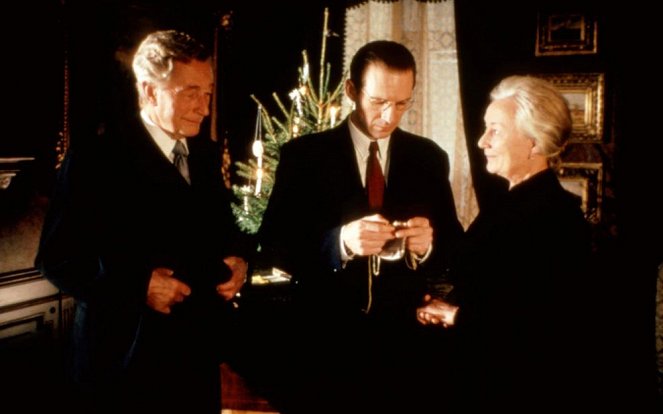Directed by:
István SzabóCinematography:
Lajos KoltaiComposer:
Maurice JarreCast:
Ralph Fiennes, Rosemary Harris, Rachel Weisz, Jennifer Ehle, Deborah Kara Unger, Molly Parker, James Frain, John Neville, Miriam Margolyes, Rüdiger Vogler (more)VOD (1)
Plots(1)
The film tells the chronicle of the twentieth century by presenting the story of four generations of a Jewish family. The great-grandfather, Manó Sonnenschein, son of a village innkeeper, advances to become a reknowned industrialist in Budapest with the help of a secret recipe, the herbal liquor called „The Taste of Sunshine". It is the great-grandfather who builds the villa of the family, evidence of their highly established position, where his two sons, Ignátz and Gusztáv, and their adoptive cousin Vali, are raised. To promote his career, Ignátz changes his name to Hungarian-sounding Sors, and Adam, the fencing champion, even gets christened. His son Iván avenges his father's death as a member of the state police, but disillusioned with the regime, he joins the revolutionaries in 1956. The only one to stick to the roots and to autonomy is Vali, and it is she who serves as a model for Iván after his years in prison. (MNFA)
(more)Reviews (3)
A really dragged out picture, but interesting even so, about the twisted fates of three generations of Hungarian Jews. Unfortunately, despite the outstanding and excellently written and acted characters, it lacks momentum. Slightly more lively directing, better editing and a more atmospheric soundtrack would have helped. The absence of music bothered me most, and when at last we hear some, it is barely audible and lasts for just a couple of seconds. The greatest asset is the excellent Ralph Fiennes in a triple role.
()
I had the same problem with Szabó's drama as with Lelouch's film Bolero. It is similarly long and megalomaniacal and has a whole series of motifs that deserve a much deeper look. On one hand, the 180-minute duration for one film is exhausting, while on the other, there are several generations and a huge number of characters that don't get enough space. Dealing with the Habsburg monarchy, Hungarian nationalism, fascism, and communism in a single film is beyond the capabilities of a director even as good as István Szabó. It still deserves four stars because the director has gathered a quality cast and Ralph Fiennes in the lead role is so good that he carries the film. It just needed a four-part series, where each episode would have the duration of a feature film. Overall impression: 75%. The most dynamic and audience-attracting part is, understandably, the middle section, thanks to the character of Adam Sors as an Olympic champion and the country's best fencer. The destinies of the first and third generations are not exceptional in the context of historical events, and their twists and turns are quite predictable.
()
A generational testimony layered into a monstrous film with quality production design, great performances, and subtle irony between the lines. In the first part of the film, we experience the rise of Ignatz Sonnenschein during the Austro-Hungarian Empire. Then follows the assassination in the 14th year and with it the separation of the Sonnenschein family, by then named Sors. After the war, we have young Adam, and later Ivan. The paths of the men of this family are lined with relationships with beautiful women. The first of these, Valerie, is played by the rusty Jennifer Ehle, drawing all her performance aids from Art Nouveau stylings. In her old age, she has the face of a gentle Rosemary Harris. She is followed by the young garcon Greta, played by Rachel Weisz. World War II is, of course, a great disillusionment. Exemplary atrocities are the reward for winning the Olympics. And the new life is just a continuation of the hell of war. And before even that is subdued, the cold and empty Deborah Kara Unger arrives on the scene. Throughout the corpus of these events, Ralph Fiennes transforms into a trio representing the entire main male line of the family, each time giving new hope for the future. There's no shame in being a Sonnenschein. Being Jewish is a question of being.
()

